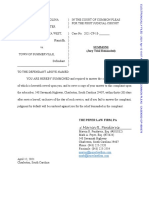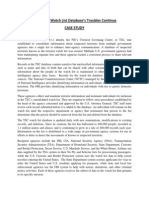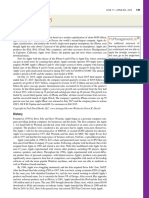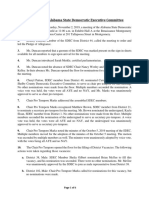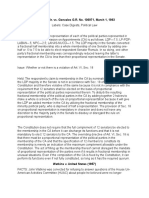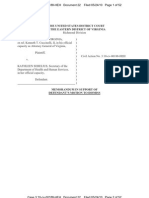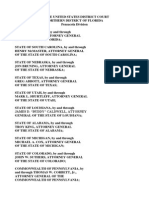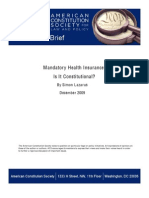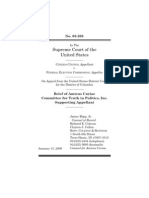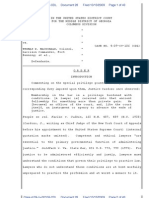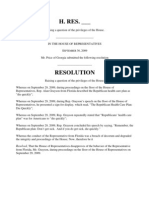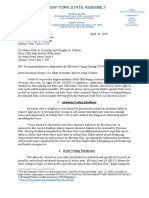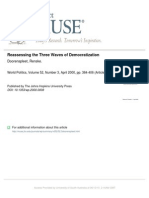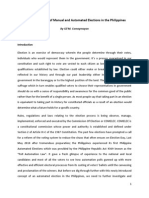February 28, 2025
Chairman Rion Ramirez
Chairwoman Hilda Solis
Credentials Committee of the DNC
Chairman James Roosevelt
Chairwoman Minyon Moore
Rules and Bylaws Committee of the DNC, Co-Chairs
430 South Capitol Street SE
Washington, DC 20003
Chairman Ken Ulman
Maryland Democratic Party
275 West Street, Ste 70
Annapolis, MD 21401
Dear Chairwoman Solis, Chairman Ramirez and Chairman Ulman,
Fifty-five years ago, United States Senator Fred Harris was the chair of the Democratic National
Committee, the “DNC.” As DNC Chair, Senator Harris ushered in the Charter and Bylaw
changes that mandated gender parity within our party from the state level to the national level.
And fifty-five years later, the world watched as our party systematically dismantled the rules of
the election that resulted in three women of color being shut out of challenging a man on the
third ballot for the last vice chair position in the 2025 Democratic National Committee Officer
Elections.
Pursuant to Article Two, Section 10(b) of the Bylaws of the Democratic Party of the United
States “the Bylaws,” the undersigned members of the Democratic National Committee (“DNC”)
are formally challenging the elections of Vice Chair Malcolm Kenyatta and Vice Chair David
Hogg held on February 1, 2025, at the DNC’s Winter Meeting. Exhibit 19.
As mandated by Rules of Procedure of the Credentials Committee of the DNC, the undersigned
DNC members are filing this challenge, and our contact information is listed below:
Honorable Kalyn Free Chair Jeanna Repass
2248 E 48th St P.O. Box 1914Topeka, KS 66601
Tulsa, OK 74105 Topeka, KS 66601
918.916.0716 913.498.3932
kalyn@kalynfree.com jeanna@kansasdems.org
1
�We are challenging the credentials, election and seating of:
Malcolm Kenyatta of Pennsylvania and David Hogg of Washington, DC
See Exhibits 17 and 18 regarding attempts to contact Mr. Kenyatta and Mr. Hogg to request their
assistance in accepting service. Also see Exhibit 19, wherein we requested Mr. Kenyatta and Mr.
Hogg’s addresses from DNC staff as well as whether the DNC would accept service for these
gentlemen.
We have contacted Mr. Kenyatta and Mr. Hogg to request physical addresses for service and
have not received a response from either of them at the time of submission. Exhibits 17 and 18.
The facts that form the basis of this challenge originated during the Vice Chair elections during
the February 1, 2025, DNC’s Winter Meeting at the Gaylord Hotel in Maryland.
I. Basis for Challenge and Violations of Charter and Bylaws
The decision to ignore the Charter, Bylaws and upend the stated Election Rules in conducting the
election for the second and third Vice Chair positions gave the two male candidates an unfair and
insurmountable advantage over the women candidates. The two men had access to 817 votes and
the three women only had access to 408.5 votes, giving the men a 408.5 head start before a
single vote was cast. Exhibit 14.
1. The Ballot that resulted in the elections of Mr. Kenyatta and Mr. Hogg violated multiple
provisions of the DNC’s Charter and Robert’s Rules of Order. Among those are:
a. “Discrimination in the conduct of Democratic Party Affairs on the basis of sex,
race, age (if of voting age) color, creed, national origin, religion, economic status,
sexual orientation, gender identity and expression, ethnic identity or disability is
prohibited, to the end that the Democratic Party at all levels be an open party.”
Article Eight, Section 2, emphasis added. Exhibit 1, Page 6.
b. “To encourage full participation by all Democrats, with particular concern
for minority groups, Blacks, Native Americans, Asian Americans and Pacific
Islanders, Hispanics, women and youth in the delegate selection process and in
all Party affairs, as defined in the Bylaws, the National and State Democratic
Parties shall adopt and implement an affirmative action program which provides
for representation as nearly as practicable of the aforementioned groups, as
indicated by their presence in the Democratic electorate . . .” Article Eight,
Section 3, emphasis added. Exhibit 1, Page 6.
2
� c. “. . . Robert’s Rules of Order shall govern the conduct of all Democratic Party
meetings.” Article Nine, Section 13. Exhibit 1, Page 8.
d. Democratic Party Credo. “a society that values and protects the fundamental
right of citizens to vote and maintains secure and fair election
administration.” Article Nine, Section 16, emphasis added. Exhibit 1, Page 9.
2. The violations of the Charter and Bylaws resulted in:
a. Exclusion of Women of Color from a Fair Process – The voting process
created an inequitable environment that effectively denied women of color equal
access to all voters and a fair opportunity to compete with men.
b. Discrimination of Women – The voting process unfairly disadvantaged women
candidates, all three of color, by limiting them to 50% (408.5) of the total
available votes, while male candidates had access to 100% (817) of the votes.
c. Suppression of Votes – The election process suppressed the members ability to
elect a woman. While the vote totals are evidence that more members preferred
women candidates over either of the men candidates, the 408.5 vote head start
could not be overcome by any of the three women individually or collectively.
d. Chaos and Confusion; Lack of Transparency, Accountability – The Rules that
were provided to the candidates prior to the election were not followed. The
process for balloting announced by the presiding officer before a single vote was
cast for the first vice chair position was not followed. The presiding officer
changed the voting process on the fly. On-site concerns about voting integrity
and process could not be addressed due to lack of DNC staff, the absence of a
clear point of contact within the Secretary’s office and the dismissal of equitable
concerns posed to the presiding officer and Parliamentarian. These failures and
violations created chaos and confusion among the members, prevented the
immediate resolution of critical issues and allowed for the inappropriate
declaration that Malcolm Kenyatta and David Hogg were elected.
e. The Presiding Officer Rushed the Process. While the presiding officer was
insistent on getting this election over quickly, it must be noted that no member
from the floor made a motion to place the five names on the same ballot or give
members two votes on the third ballot. In fact, even after being in the meeting for
12 hours and 26 minutes, the total votes cast in the last ballot were 408.5 for the
Male position and 408.5 votes for Any Gender, while the total ballots cast earlier
in the day in the Chair’s race was 428. Less than 20 members had left between the
3
� first vote of the day and the last. No one was clamoring to rush the process and no
one offered a motion to do so. Members were settled in and their commitment to
the candidates of their choice were so important to them, that they were not
leaving. Exhibit 6, Tr. Page 370 lines 18 – 22, Page 371, lines 1 – 4.
f. Prevented Equal Access to Red State Candidates - When the presiding officer
announced an ill-timed motion was up for debate (in an attempt to clean up his
earlier unilateral action on the Blanco ballot), California DNC Member, Christine
Pelosi, pointed out the inequity of this decision to rural candidates in particular
with the following statement:
“My issue with the esteemed chairwoman's motion is this: I feel like this process
has unnecessarily dampened the true support that exists for some of these
candidates. There are rural candidates in this room who have many, many
more votes than were reflected in the first two rounds because it can only be
your top candidates. And my concern is that if we don't give them an
opportunity to show some of their support, then we'll only end up with the
top candidates who thus far have ended up being all ultimately urban
candidates.” Exhibit 6 Tr. Page 345, lines 6 - 16
3. The presiding officer’s decision to put all 5 candidates on the same and last ballot,
instructions to members, and failure to segregate the Male and Any Gender votes resulted
in the following actions and a fatally flawed result:
a. The two men had the opportunity to compete for 817 total votes.
b. The three women could only compete for 408.5 votes.
c. Each member was allowed to cast two votes.
d. Each member was ordered to cast at least one vote for one of the two men.
e. The win number was determined to be 205 (for the men.)
f. The win number was ¼ of the total plus one votes the men could
compete for.
g. Mr. Kenyatta and Mr. Hogg were given a 408.5 vote head start on the
women candidates.
h. Even if one of the women had received the 205 votes required to win she
still could not have won because of the vote advantage enjoyed by the two
male candidates.
i. The presiding officer told the members there would be another ballot.
j. The members, like the presiding officer, believed they would elect one
person on the Kenyatta/Hogg ballot and then they would vote for the third
vice chair on the fourth ballot.
4
�The purpose of this challenge is to address the fundamentally flawed election and the unfair
results that prevented three women of color from being considered by the members on the third
ballot. It is not to place blame on any certain individual. However, we do note that counsel for
the DNC, Andrea Levein stated that the Parliamentarian instructed the counters to tally all votes
together. Exhibit 10, Page 2. Furthermore, the Parliamentarian stated that the “Chairman” made
the determination to place all 5 candidates on the same ballot. Exhibit 11, Page 2.
We agree with Ms. Levein’s statement below:
“Yes. I think we need to also just be keeping in mind what everyone's vote tallies were
throughout this process. If there had been a female ballot, Artie Blanco would have been
elected. If there was a male ballot, Malcolm Kenyatta would have been elected. If
there was then an any gender ballot, which is required by our rules under our
charter bylaws, it would have been David Hogg versus Free, Conrad, and Repass.”
Exhibit 11, Pages 10-11.
Had the election been done correctly and proceeded as Ms. Levein stated above, then Mr.
Kenyatta and Mr. Hogg would not have been allowed to compete for 817 votes, while Shasti
Conrad, Kalyn Free, and Jeanna Repass were limited to 408.5 votes. Additionally, as Ms. Levein
correctly pointed out, the third Vice Chair would have been a race between the male who got the
least amount of votes and the three women candidates.
It is undisputed by the Parliamentarian, DNC legal counsel, and DNC staff that Parliamentarian
decided to “aggregate vote totals” without providing guidance on how to separate male
candidates from “other gender” candidates. Additionally, vote counters were instructed to
aggregate totals, making it impossible to determine whether Mr. Kenyatta or Mr. Hogg actually
reached the required 205 votes on the “first ballot.”
In fact, the DNC staff and legal counsel have confirmed that the placement of the names on the
ballot, whether it be on the top line, bottom line or same line, was not considered in counting the
ballots. After reviewing the ballots, it is obvious that it is impossible to determine voter intent by
the name placement on the ballot. Thus, it is impossible to determine how many of the 104 votes
that were from the “any gender” ballot were attributed to either Kenyatta or Hogg. Neither the
DNC staff nor our campaign staff can determine the precise or even approximate number of
votes that Kenyatta or Hogg benefitted from the Any Gender ballot.
By placing all five candidates—Mr. Kenyatta, Mr. Hogg, Ms. Conrad, Ms. Free, and Ms.
Repass—on the same ballot and aggregating votes across two rounds, the process unfairly
5
�disadvantaged the women candidates. Mr. Kenyatta and Mr. Hogg first competed exclusively
against each other for 408.5 votes and then carried those votes over to compete for another 408.5
votes against the three women. This structure ensured that two men were elected while
preventing any woman from competing on equal footing. This was a clear violation of the DNC
Charter and Bylaws, undermining gender diversity and fairness.
The only way Mr. Kenyatta and Mr. Hogg were able to reach their purported 205-win threshold
was by borrowing votes from the second set of 408.5 votes meant for the third Vice Chair
position.
Vote Breakdown:
● Total Votes Counted on Ballot #3 : 817
○ Win Threshold: 205
○ Total Abstentions: 5
● Total Votes Available for Male Candidates on Ballot #3: 817
○ Malcolm Kenyatta: 298
○ David Hogg: 214.5
○ Total Men’s Votes: 512.5
● Total Votes Available for Female Candidates on Ballot #3: 408.5
○ Jeanna Repass: 112
○ Kalyn Free: 96
○ Shasti Conrad: 91.5
○ Total Women’s Votes: 299.5
Exhibit 14.
This improper counting method—failing to separate votes for the required male-gendered Vice
Chair position from those for the any gender Vice Chair position—created an insurmountable
barrier for female candidates and resulted in an erroneous outcome for either Mr. Hogg or Mr.
Kenyatta or both. Furthermore, we reiterate that due to this flawed process, it is impossible to
determine which candidate rightfully won the required male-gender Vice Chair position.
The DNC has insisted that “placement of names on the ballot” was not considered in the vote
tallies. No instructions were given to the members to delineate in any way on the ballots which
votes were being cast for the “Male” and the “Any Gender” ballots. After an exhaustive two day
review of every ballot by campaign staff, it was confirmed that voter placement of names was
inconsistent making it impossible to determine whether any of the 817 votes cast, with one
exception, were intended for the “male” or “any gender”. The single member specifically
delineated that her two votes, both for males, were for the “male” position and the “any gender”
position. It is impossible to determine whether Mr. Kenyatta or Mr. Hogg legitimately secured
205 votes in the first round without carrying over votes from the second round. Exhibit 15.
6
�Despite the structural disadvantage, the results indicate a strong preference for women
candidates. After being forced on the third ballot to vote for a male candidate first, women
candidates received 72.77% of individual members' votes—meaning nearly three out of four
voters supported electing a woman. 302 out of 415 voting members cast their second vote for
a woman. Only 113 members voted exclusively for men. Even with the men holding a 408.5-
vote advantage, the three women’s combined total of 299.5 votes exceeded both Mr. Kenyatta’s
298 votes and Mr. Hogg’s 214.5 votes. Exhibit 14.
The election process was fundamentally flawed, structurally favoring male candidates and
preventing women from competing fairly. By aggregating votes across ballots and failing to
distinguish between gender categories in a meaningful way, the DNC’s process violated its own
Charter and Bylaws, undermining both fairness and gender diversity.
II. Remedies Invoked by Each Challenging Party
1. Kalyn Free and Chair Jeanna Repass delivered a letter to Chairman Ken Martin on
February 7, 2025, notifying him of the significant irregularities in the voting process for
two of the Vice Chair elections. Neither received a response from Chairman Martin.
Exhibit 8.
2. The campaigns for Ms. Free and Ms. Repass have had two Zoom calls with staff from the
DNC including Helen McFadden. On both of those calls we explained the irregularities,
basis for our claims, violations of the Rules and the fundamental unfairness and
adherence to the DNC’s rules for gender balance.
III. Relief Requested
We request a new election for the second and third Vice Chair positions to ensure a fair and
transparent process. This election must allow DNC members to elect both the required male Vice
Chair and a Vice Chair of any gender, with clear instructions and an accurate, transparent vote
count. This process will guarantee fairness for the candidates competing for the second Vice
Chair position and for the four candidates—three women and the remaining unelected male
candidate—who should compete under the same conditions for the third Vice Chair position.
We request that the election of Malcolm Kenyatta and David Hogg be found to violate, through
no fault of either candidate, the DNC Charter and Bylaws, the Rules of Procedure governing
elections, and fundamental fairness. The process was discriminatory against the three women
candidates, all of whom are women of color. To correct this, new, separate elections should be
held. For the second Vice Chair position, only Malcolm Kenyatta and David Hogg should appear
on the ballot, with members instructed to cast a single vote. The candidate receiving the majority
of votes should be recognized as the elected Vice Chair.
7
�For the third Vice Chair position, the male candidate who does not win the second Vice Chair
election should be placed on a ballot with Kalyn Free and Jeanna Repass. Ms. Conrad has
confirmed that if a new election occurs, she will withdraw her name from the ballot. Members
would cast a single vote for their preferred candidate thus resulting in less confusion. If no
candidate receives a majority, the candidate with the fewest votes should be eliminated, and a
second ballot should be conducted among the remaining three candidates. If necessary, a third
ballot should be held between the final two candidates. In the case of a tie at any stage, members
should vote again without eliminating any candidates.
This process ensures a fair election in which all candidates compete under the same conditions,
restoring integrity to the selection of the Vice Chair positions.
IV. Contradictory & Confusing Statements by the Presiding Officer while Conducting the
Elections, Violations of Charter & Bylaws & Election Rules
After nominating speeches were concluded for the Vice Chair At-Large candidates, the presiding
officer explained the process for the Vice Chair elections. Explaining first that while the process
was lengthy, competing for one Vice Chair position on each ballot was the only way to ensure
equality across the ballot. Exhibit 6, See Tr. Pages 327-333.
A. The presiding officer spoke in detail about attempts to “. . . we tried to explore ways
to quicken the pace but . . . For whatever reason, we can’t.” Exhibit 6, Tr. Page 327
lines 20 - 22 and Page 328 lines 1 - 5.
ACTION: In direct contradiction to the Chair’s statements that “we can’t quicken the
pace” The presiding officer decided to order members to cast two votes instead of one on
the second “Artie Blanco Ballot.”
B.“And then one of the things that I want you all to know for this next ballot, please,
please, please, we're going to expedite -- we're finding out ways to expedite this.
Because of our gender balance provisions on this next ballot, you will be able to vote for
two candidates of any gender on the next ballot. So on this next ballot, you will be able to
vote for two candidates of any gender on the next ballot. Exhibit 6, Tr. 336, lines 10 – 20.
ACTION: The presiding officer, in violation of the Rules, had a cascading effect on the
remaining “Kenyatta/Hogg Ballot.”
C. Prior to the election of the first Vice Chair, (“Artie Blanco Ballot”) the presiding
officer was patently clear about the balloting process, stating:
“As we must elect a candidate of any gender as well as one male and one female vice
chair, we will first ask members to elect a candidate of any gender on the first ballot. Any
8
�candidate, male, female, and nonbinary can be elected on that ballot. Exhibit 6, Tr. 330,
lines 3 - 8.
After a candidate is elected on the first ballot, we'll have one officer of the three. So we
will know which position is filled of the one male, one female, and one vice chair of any
gender. Our second ballot will also be for a candidate of any gender. Then our third
ballot will be the third position that is remaining based on the two results, either a
male candidate, if a candidate that is not male that has not been elected, or a female
candidate, if a female has not been elected.” Exhibit 6, Tr. 330, lines 9 - 18.
RESULT: While the presiding officer was clear that there would be a second ballot to
elect “ a candidate of any gender” which would dictate the gender of the third ballot,
that did not happen. By mandating that members were to cast two votes on the
“Kenyatta/Hogg Ballot,” there was no third ballot allowing for the election of a candidate
of the opposite gender.
D. Additional evidence will be presented to the Credentials Committee of the chaos on
the floor during the “Artie Blanco” and “Kenyatta/Hogg” Ballots and the confusion
among the members of the ever-changing instructions. One clear example is set forth
below, which occurred prior to the “Kenyatta/Hogg” ballot:
UNIDENTIFIED SPEAKER:
“We will be electing one person on the next election and then there will be another round
in which all candidates will be back on the ballot? Exhibit 6, Tr. 358, lines 18 - 21.
CHAIR HARRISON:
“No, that's not this. Let us get through this first, and then I will give you an idea
what's going to be on the next ballot. Okay? Thanks. Exhibit 6, Tr. Page 358 Lines 18 -
22 Page 359 Lines 1 - 4.
This statement alone, disregarding the voluminous other evidence, clearly shows that the
presiding officer fully expected, just like the candidates and the members, that the
“Kenyatta/Hogg” ballot would elect one person - a man - and the third ballot would have
all remaining candidates of both genders, which would have been one man and three
women, on it. Because the body had just elected Ms. Blanco, a woman, evidence will
support that the members were fully expecting to elect a man, and then proceed to a third
“any gender” ballot for the last ballot.
9
� E. After Ms. Blanco was elected to hold the first vice chair position, the presiding officer
decided to place the remaining 5 candidates on the same ballot, order the members to cast
two votes and then repeatedly instructed the members five times in less than 90
seconds that members must vote for a male. Exhibit 6, See Tr. Pages 365 - 366.
The members fell in line and Kenyatta and Hogg received 512.5 votes combined, however
neither one of the men were able to reach the win number without “raiding” the second half of
the votes allotted to men and women. After 408 of the 415 voting members cast their one
obligatory vote for men - votes which women could not compete for - 302 members chose to
cast 299.5 votes for a woman as their second vote. Only 113 members did not cast a vote for a
woman.
Kenyatta and Hogg equally received 110.5 votes each (or 221 cumulative votes) on ballots cast
only for the two male candidates. Of those votes, 117 should be attributed to the male Vice
Chair ballot line and 104 should be attributed to the third Vice Chair ballot line that included the
women candidates.
Kenyatta and Hogg “raided” 104 votes from the third Vice Chair ballot line. Splitting the 104
votes evenly, each of the men got a 52 vote boost from the third Vice Chair ballot line. Both of
them each had to have those 52 votes in order to reach their 205 win number.
V. Rules of Election
The Secretary’s Office held a briefing for DNC Vice Chair Candidates on January 24 to outline
the election process and voting logistics for candidates. Following the briefing, candidates were
provided a slide deck that explicitly set expectations for a fair election. The final bullet of the
slide below stated, “Then there will be a ballot for the one Vice Chair of any gender,” to take
place only after the elections for the required gender-specific Vice Chair positions. Exhibit 4,
Page 23.
10
� VI. Notice to Parliamentarian, Presiding Officer & Secretary
There were two completely separate recognitions of both the counting irregularities and
the ramifications of those irregularities.
A. Notice from Governor David Walters to Chair and Secretary
On Saturday, February 1, 2025, at 9:19 pm, shortly after the presiding officer announced that
members would be casting two votes and one of those had to be for a man, Oklahoma DNC
Committeeman David Walters sent an email below to the presiding officer and Secretary Jason
Rae. The email explicitly points out the inherent bias towards the two men and the fact that the
three women would be denied the opportunity to compete on a third ballot. Exhibit 7.
B. Notice to Parliamentarian by Kerry Gooch and Andriy Bilyk
When Mr. Gooch and Mr. Bilyk notified Helen McFadden that the vote counting process favored
the two male candidates, the Parliamentarian assured them that their concerns were unfounded
and that the “final results would likely elect one man and one woman from a rural area for the
final two Vice Chair positions.” Exhibit 16.
VII. Vote Tallies & Ballot Inspection
On February 18 & 19, Kirsti Holland traveled to the DNC Headquarters in Washington, D.C. on
behalf of the Free and Repass campaigns to conduct a thorough review of the ballots for all three
11
�Vice Chair At-Large positions. Due to the reports from the watchers in the count room coupled
with the extreme ten day delay in the DNC providing the vote tallies, we were not shocked to
discover the balloting/counting process revealed alarming irregularities and failure to follow
stated rules in counting.
As Ms. Holland observed, “Additionally, I noted numerous irregularities, including missing
required information, unallowed proxy votes, and instances of incorrectly tallied votes. While
these gross irregularities did not affect the final outcome of the elections, the failure of the
Counters to properly follow the Rules is deeply troubling. Should the RBC and the DNC decide
to address these issues to ensure the integrity of the election process, I will provide my report and
recommendations at the appropriate time.” Exhibit 15.
Suggestions will be made to the RBC to implement basic electoral processes to strengthen
internal controls to ensure that votes are counted properly.
Conclusion
Pursuant to Rules of Procedure 6.G.1. and given the fatally flawed election that violated the
DNC Charter and discriminated against three women of color candidates, we respectfully request
the Credentials Committee schedule a hearing on this Challenge and consider the requested
Relief sought. At such hearing, we will present additional evidence to support the Challenge. In
our Request for Relief for two new vice chair elections, we stand firm in our resolve that the
DNC must take corrective action to prevent further discrimination, rectify the fatally flawed
elections of the second and third Vice Chairs ensure future elections follow not only our Charter,
but live up to the very values we as Democrats fight for every day: free and fair elections, and
fight against every day: discrimination of women and people of color. We must live our values,
adhere to principles of transparency, fairness, and inclusion and follow our Charter, Bylaws and
Rules of Election. We appreciate your attention to this critical matter and look forward to your
response.
Sincerely,
Jeanna Repass
Honorable Kalyn Free Chair Jeanna Repass
Via Email
cc: Chairman Ulman
Mr. Malcolm Kenyatta
Mr. David Hogg
12






























